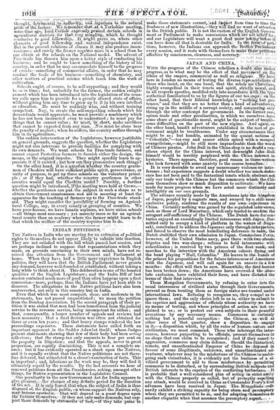INDIAN - PETITIONS.
made, on grounds convincinc, to .their. OM Minds; have not re- rights to themselves do not appear likely to subside into inaction. ceived due attention from the Government and Parliament at They are not satisfied with the, bill which passed last session, and are perhaps inclined to suppose, ttat represthtations which they THE Natives in Indidisho are moving for an extension ofpolitical home. When they have had a little more experience in English politics, they will learn that the Thitish. Parliament never grants
demand, however well-founded or established, without taking a any
long while to think about it. This deliberation is one ofthe boasted qualities of the English Legislature ; and the India Bill of last session contained much more good than often happens upon a flySt concession—niore,:perhaps, than the Indians have vet been able to discover. The allegations is the Native petition;" have also been controverted, not only in this country but in India. Even that which was most compact, clear; and moderate in its statements, has not passed Unquestioned ; we mean' ean the 'petition from the Bombay Association. In the second paragraph of their pe- tition it was stated that men had been treinsferred from the judicial service to the revenue service, being incompetent for either; and that,- consequently, a larger number of *appeals and reviews had been necessary; flint a final deeision was often not obtained for three or even ten years ; and that heavy stamps rendered the law proceedings expensive. These statements have called forth an important opponent in the Sudder Adawlut itself; whose Judges present statements showing that few of their body, had been acting collectors; that the stamp-tax only amounts to four per cent on the property in litigation ; and that the appeals, never in great proportion, are rapidly diminishing. This is not a complete an- swer; but it has evidently operated as a check upon the Natives, and it is equally evident that the Native politicians are not there- fore deterred, but stiiriiillited to a closer examination of facts. This is important and, laborious as the Work may be, they will find it ultimately repaid by the results. - By thelast accounts we hear of renewed petitions.fromalb.the,Presidereies, asking, amongst other thin'gS., for Native yepresentation the Legislative Council. • One peculintitylinAhe new Government Act for India-appears to give pleasure,the- Os-pee of any definite period for the duration of the act. It is only feared that when the subject of India- is thUs disposed of, the geglish, public- on whose support the. ZI.atives ,rely, may. biktotiettpathetie:i., That public, depend in:a great 'degree upon the Indiana Vietclielvtti'f'wifIlte),Iiiit only make demands, but sup port those 'd Ilirettiike pains to freshness of new illustrations,—they wi find no want of attention in the. British public. It is not the custom Ogle English Gexern- ment or Parliament to Make" concessions WhictSM n8t.rfffori can have done all that is desirable for Dial-S.-11'n fdifliFioffit tions, however, the Indians can approach the tri every session, and it rests with themselves to and our Legislature will want a great deitlifiblie
effective by conciseness, clearness, and Accuracy. thought, detrimental .t r the nat4n1 make those statements correct, 'and iI4irt from time to time the


























 Previous page
Previous page